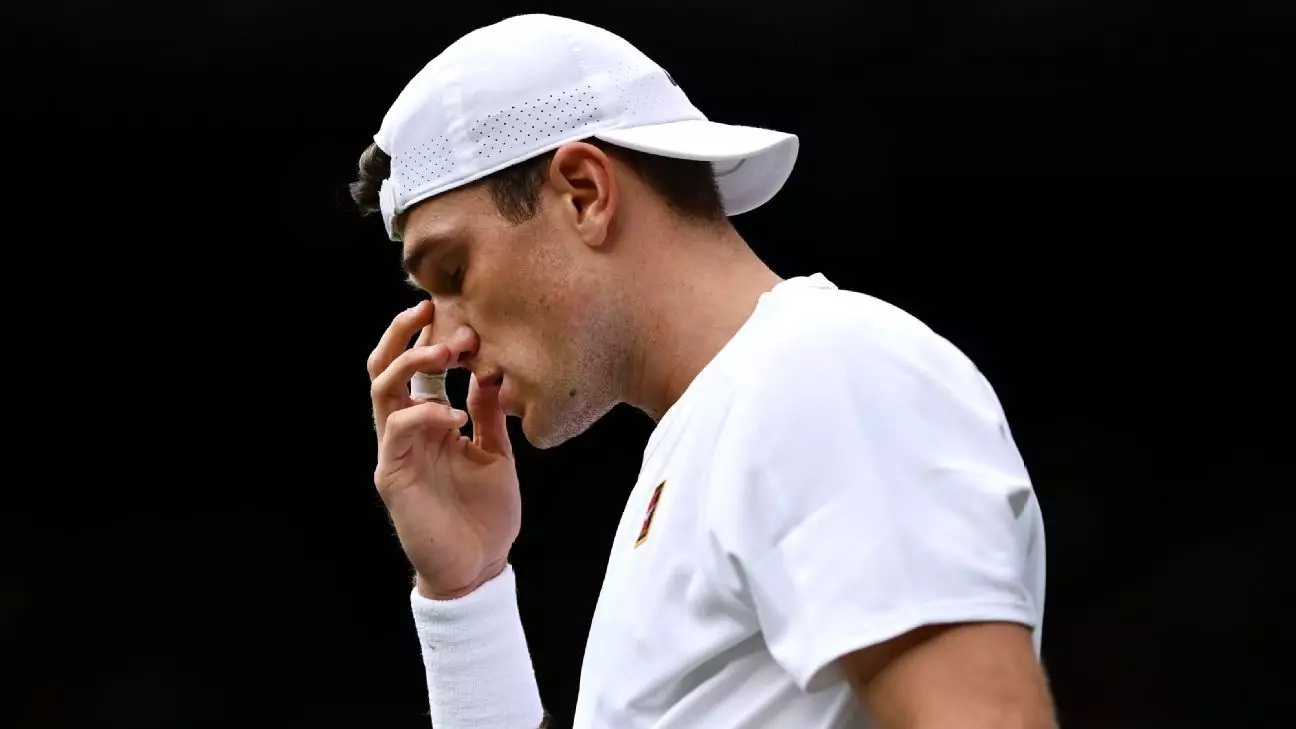In the highly competitive world of professional tennis, few stories evoke as much anticipation and subsequent disappointment as the saga of Jack Draper’s Wimbledon quest. Once lauded as one of Britain’s brightest prospects, Draper’s aspirations on the grass courts have been consistently marred by relentless challenges, both physical and psychological. His latest clash with Marin Cilic not only exposed the chasm between potential and realization but also highlighted the brutal nature of the sport—an unforgiving arena where talent alone does not guarantee success. Draper’s subsequent defeat underscores the painful truth that even promising athletes must often grapple with failures that threaten to define their careers.
Draper’s journey at Wimbledon has been fraught with setbacks, notably his inability to advance beyond the second round despite the tournament’s significance as his home competition. Such repeated early exits are a stark reminder that talent, while crucial, can be rendered ineffective without resilience and strategic development. His recent loss to a seasoned champion like Cilic, especially in four closely contested sets, exemplifies the thin line separating triumph from heartbreak in tennis. It is a merciless sport where mental fortitude is as vital as physical prowess, and Draper’s struggle highlights the arduous path under the bright spotlight of a home Grand Slam.
The Disparity Between Talent and Experience
What makes Draper’s defeat particularly illuminating is Marin Cilic’s remarkable journey back from injury and doubt. Cilic, a player with semifinal appearances at grand slams and a towering serve, epitomizes perseverance. His struggle to return to top form after two knee surgeries illustrates the resilience required to compete at the highest levels. His victory on grass—an arena where he is relatively untested—represented a symbolic triumph over adversity. Despite his lower ranking and a lengthy absence from Wimbledon (since 2021), Cilic’s mastery on serve and groundstrokes demonstrated that experience and mental strength hold significant sway over raw youthful exuberance.
This contrast between Draper and Cilic is emblematic of a larger truth in tennis: potential can only translate into results through a combination of physical health, tactical acumen, and mental resilience. Draper’s youthful energy and talent, while evident, remain insufficient without the seasoning that comes from facing seasoned opponents and navigating the mental pressures of a grand slam. His inability to capitalize on favorable moments during the match, despite moments of promise such as salvaging break points, demonstrates that promise alone cannot overshadow the importance of consistency and strategic adaptation.
The Demoralizing Effect of Expectations and the Public’s Role
The pressure exerted by national expectations weighs heavily on athletes like Draper, especially when competing on home soil. The hope that Britain might see a new wave of home-grown champions—potentially five in the third round—fueled a collective belief that young players such as Draper could rise to the occasion. When multiple compatriots faltered early, the spotlight intensified on Draper to uphold national pride. The electric atmosphere created by the raucous crowds on Court One exemplifies both the support and the immense psychological burden athletes face during such moments.
Despite the fervor and crowd support, Draper’s inability to sustain momentum in the critical moments underscores a harsh reality: the difference between a future star and a player still learning to handle pressure can be decided in a handful of game points. His last-ditch efforts, bringing the audience to their feet with thunderous serves, only delayed the inevitable. The match served as a brutal reminder that as much as fans believe in potential, the sport is an unforgiving teacher that demands mental resilience, strategic finesse, and a relentless desire to learn from setbacks.
Wimbledon as a Reflection of Growth and Hardship
Draper’s current state illuminates how Wimbledon embodies more than just a tennis tournament; it’s a crucible for growth, failure, and resilience. For young players like Draper, each defeat carries lessons that no amount of coaching or training can replace. His experience, already filled with heartbreak, will remain part of his narrative until he harnesses these setbacks into future progress. The tournament’s history is replete with stories of players who faced initial disappointment before carving their names into tennis lore.
Meanwhile, Cilic’s journey back to the spotlight—marked by grit and unwavering resolve—serves as a stark contrast to Draper’s story. It highlights that recovery and perseverance are integral to reaching one’s peak, reminding us that greatness often requires overcoming persistent obstacles. Draper’s challenge moving forward is to see these defeats not as finality but as necessary steps in the arduous process of development, where true champions are forged in the fires of adversity, not in moments of effortless victory.
In this context, Draper’s current predicament offers a sobering yet hopeful narrative: that potential alone is insufficient, and success hinges on resilience, mental toughness, and the willingness to embrace failure as part of growth. Wimbledon may have denied him a chance at a deeper run this year, but it also provided him a vital lesson—one that could shape his journey long after the grass courts have been packed away.

